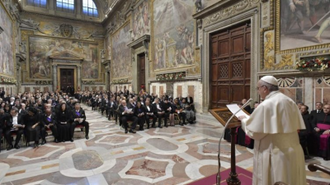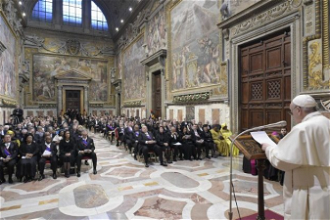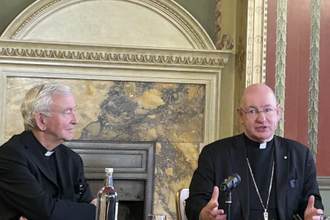Pope warns Diplomatic Corps about fragility of international order + Annual Address text

Source: Vatican Media
Pope Francis' annual New Year's address to members of the Diplomatic Corps today was devoted to the importance of multilateral diplomacy and good will between nations, to avoid the oppression of the most vulnerable.
The Pope began his multfaceted and lengthy address by noting agreements that had been ratified by the Holy See and a number of states over the past year. One such accord was the signing of a Provisional Agreement between the Holy See and the People's Republic of China on the Appointment of Bishops in China.
The Pontiff said he was thankful that, "for the first time after so many years, all the bishops in China are in full communion with the Successor of Peter and with the universal Church. He then added that, "it is to be hoped that further contacts regarding the application of the signed Provisional Agreement will help resolve questions that remain open and make needed room for an effective enjoyment of religious freedom."
Taking up the theme of multilateralism, Pope Francis noted that this year marked the hundredth anniversary of the League of Nations which, he said, represented "the beginning of modern multilateral diplomacy, whereby states attempt to distance their reciprocal relations from the mentality of domination that leads to war."
The Pope underlined that "an indispensable condition for the success of multilateral diplomacy is the good will and good faith of the parties, their readiness to deal with one another fairly and honestly, and their openness to accepting the inevitable compromises arising from disputes. Whenever even one of these elements is missing, the result is a search for unilateral solutions and, in the end, the domination of the powerful over the weak, he said."
Some attitudes, such as nationalism the Pontiff emphasized, could be traced back "to the period between the two World Wars, when populist and nationalist demands proved more forceful than the activity of the League of Nations. The reappearance of these impulses today is progressively weakening the multilateral system, resulting in a general lack of trust, a crisis of credibility in international political life, and a gradual marginalization of the most vulnerable members of the family of nations."
Pope Francis recalled that Saint Paul VI, at the United Nations, had spoken of "the purpose of multilateral diplomacy, its characteristics and its responsibilities in the contemporary context, but also of its points of contact with the spiritual mission of the Pope and thus of the Holy See."
One of those points of contact, he said was the primacy of justice and law, adding that at present, it was troubling "to see the re-emergence of tendencies to impose and pursue individual national interests without having recourse to the instruments provided by international law for resolving controversies and ensuring that justice is respected, also through international Courts."
Such an attitude, he added, "is at times the result of a reaction on the part of government leaders to growing unease among the citizens of not a few countries, who perceive the procedures and rules governing the international community as slow, abstract and ultimately far removed from their own real needs."
Then, quoting from his Message for this year's World Day of Peace, on the theme: Good Politics at the Service of Peace, he said, "there is a close relationship between good politics and the peaceful coexistence of peoples and nations. Peace is never a partial good, but one that embraces the entire human race… Politics must be farsighted and not limited to seeking short-term solutions."
Focusing on an issue close to his heart, that of defending the most vulnerable, Pope Francis emphasized the Church's commitment to assisting those in need and he called on the international community and its agencies "to give a voice to those who have none. "I would mention", he continued, "the victims of other ongoing wars, especially that in Syria with its high death toll. Once more, I appeal to the international community to promote a political solution to a conflict that will ultimately see only a series of defeats."
The Pope also recalled the Christian communities living in the Middle East and displaced persons who have been forced to flee their homes due to conflict or hardship in their own countries.
Highlighting the plight of migrants, Pope Francis again appealed to governments "to provide assistance to all those forced to emigrate on account of the scourge of poverty and various forms of violence and persecution, as well as natural catastrophes and climatic disturbances, and to facilitate measures aimed at permitting their social integration in the receiving countries."
The Pope also paid particular attention to another vulnerable category, that of children, saying, "here I cannot refrain from speaking of one of the plagues of our time, which sadly has also involved some members of the clergy. The abuse of minors is one of the vilest and most heinous crimes conceivable. Such abuse inexorably sweeps away the best of what human life holds out for innocent children, and causes irreparable and lifelong damage. The Holy See and the Church as a whole are working to combat and prevent these crimes and their concealment, in order to ascertain the truth of the facts involving ecclesiastics and to render justice to minors who have suffered sexual violence aggravated by the abuse of power and conscience. My meeting with the episcopates of the entire world next February is meant to be a further step in the Church's efforts to shed full light on the facts and to alleviate the wounds caused by such crimes."
Peace and peace building was another key theme in this address with the Pontiff noting that in the course of the past year, there had been some significant signs of peace, starting with the historic agreement between Ethiopia and Eritrea, and an agreement signed by the leaders of South Sudan. Positive signs, he said were also arriving from the Korean Peninsula.
Pope Francis remarked that he was following with special concern "the developing situation in the Democratic Republic of Congo." "I likewise express my closeness to all those suffering from fundamentalist violence, especially in Mali, Niger and Nigeria, and from continued internal tensions in Cameroon, which not rarely sow death even among civilians", he said.
The Pontiff also expressed the hope that peaceful institutional means could be found to provide solutions to the ongoing political, social and economic crisis in Venezuela and the hope too that dialogue between Israelis and Palestinians would resume.
Pope Francis stressed another feature of multilateral diplomacy that of rethinking our common destiny. He stressed that this common destiny involved rethinking our relationship with the planet and underlined that "international relations cannot be held captive to military force, mutual intimidation, and the parading of stockpiles of arms."
In his concluding remarks the Pope expressed the hope that this New Year would see a "strengthening of the bonds of friendship uniting us and renewed efforts to promote that peace to which our world aspires."
Read the official English translation of the full address here: www.vaticannews.va/en/pope/news/2019-01/pope-francis-address-to-diplomatic-corps.html


















